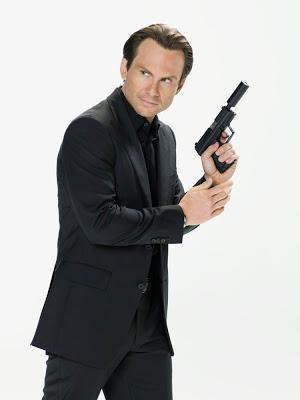
I interviewed actor Christian Slater in November, 2008 for Venice Magazine. Having long had a reputation as an "enfant terrible" in his youth, Slater surprised me somewhat with his calm, measured demeanor and thoughtful outlook. He was promoting his well-reviewed, but ultimately short-lived, TV series "My Own Worst Enemy," which we discussed a bit, but Slater was eager to reflect on his entire career and life, which he did with aplomb. My other memory of the chat is that during our dinner, the power went out in the restaurant or hotel where we met (the location of which has been lost to time) and the halogen streetlights outside casting our talk in a strange, other-worldly glow for a good 30 minutes. All these factors made our meeting a memorable one. Slater can currently be seen on the new USA Network series "Mr. Robot," which is also being lauded critically, and will hopefully be gifted with a longer run than "My Own Worst Enemy."
CHRISTIAN SLATER IS HIS OWN WORST ENEMY
By
Alex Simon
Christian Slater first entered the public eye with his turn in the genre-shattering classic Heathers in 1988, playing a teenage rebel who evolves from smokin’ in the boys room, to bumping off his sadistic classmates, to becoming a homegrown terrorist by the film’s conclusion. Slater was instantly dubbed “the new Jack Nicholson” by press and public alike, and soon found himself to be not only in demand as an actor, but also fodder for the tabloids, a fate that hasn’t been kind to many young actors throughout Hollywood history, particularly in the past year. However, Christian Slater decided he was a survivor somewhere along the line, and has grown into an actor of range and skill after successfully navigating the rocky road of early success.
Born Christian Michael Leonard Slater on August 18, 1969 in New York City, Slater is the son of actor Michael Slater (aka Michael Hawkins), and casting director Mary Jo Slater. Growing up surrounded by the smell of the greasepaint and the roar of the crowd rubbed off on young Christian, who was discovered by veteran Broadway director Michael Kidd and cast in a revival of The Music Man in the late ‘70s. He scored his first major film with The Name of the Rose in 1986, and has also appeared in such lauded titles as Tucker, Pump Up the Volume, True Romance, Interview with the Vampire and The Contender. Slater was part of the ensemble cast of Emilio Estevez’s critically-acclaimed Bobby in 2006, and has kept busy doing stage work recently, including a heralded turn as McMurphy in the London revival of One Flew Over the Cuckoo’s Nest.
Christian Slater brings his unique brand of talent to television this Fall with NBC’s new series My Own Worst Enemy, where Slater does double-duty as Henry Spivey, a seemingly-ordinary suburban dad and husband who also leads a secret life as intelligence operative Edward Albright. The catch: neither personality knows about the other, until both find their single life very much in danger. The show premieres October 13th on NBC.
Christian Slater sat down recently to discuss his career past, present and future. Here’s what was said:
My Own Worst Enemy marks your first TV series as a star. Is it a different process than working on a feature?
Christian Slater: Well, the primary difference is the speed at which you work. You work much faster in television. We took 14 days shooting the pilot, and we’re creating this whole new world here, so it was just this incredibly creative environment. When the pressure is on, great ideas tend to spring forth, and I think they have in this case. We’re close to finishing the second episode now, and I’m just having a great time, one of the best times I’ve had in my career, actually. It’s edgy, it’s interesting, and they’re delving into some really interesting areas. We’re all getting comfortable around each other, and becoming creative together on the set. It just feels like there’s a real focus, and the train is rolling out of the station now. It’s just going to be crazy. It’s a crazy, crazy show.
A lot of the actors I’ve spoken with in the past who have gone from features to television, say that the idea of doing a weekly series is really comforting, because you never lose that little voice in back of your head that every job could be your last.
You do have that fear and anxiety, no question. But being part of this particular show with this network (NBC), their support has been amazing. The Olympics alone gave us such amazing publicity that it really helped put wind in our sails. I should thank Michael Phelps for keeping it all so interesting, and keeping people tuned in as they were! So when you have that kind of support from “management,” so to speak, going into it, it lessens the anxiety—a lot!
Not only is shooting a television episode more time-constrained, but you’re playing two completely different characters who are in virtually every scene. It must be exhausting as well as exhilarating.
I never stop, and there’s not much time to myself, that’s for sure. It’s me talking to myself from one angle, then me talking to myself from another. We should also be clear that it’s not two different guys. It’s just me! (laughs) There’s sometimes some confusion that there’s a twin, or a clone or something. It’s all me: two guys in one body. There’s a microchip in my brain that separates the two personalities.
I’d imagine one advantage from an acting and a writing standpoint is that since with TV you’re really making a series of short films, rather than a single feature, it allows you to go much deeper into the characters and situations than you would in a traditional movie.
God, yes! Each episode really ends on a cliffhanger, and goes into the next episodes. I hope they keep that formula going. The other great thing is that I get to live in two worlds: one normal world, and then this world of incredible adventure.
You’re basically living out every boy’s fantasy: what boy didn’t grow up wanting to be James Bond?
Exactly! And some of the scenarios are really wacky and out-of-control, where I get to live out some of those fantasies.
It’s kind of like the ‘60s all over again: James Bond gave birth to great shows like Man From UNCLE, I Spy, Mission: Impossible, and now the reinvention of the Bond series and the Bourne films have really given new life to the whole spy genre, that’s transferring over to television.
Yeah, we’ve been talking about that quite a bit on the set, especially I Spy because Robert Culp and Bill Cosby had such great chemistry. We really let ourselves sort of go crazy and play. This is definitely one of the more fun sandboxes I’ve ever gotten to be in.
Let’s talk about your background. You were born and raised in New York.
Yeah, my dad’s an actor, he was the first Jack Ryan on Ryan’s Hope and was a pretty big soap star. My mom’s a very well-known casting director. I would make my dad take me to work with him when I was little, and watch him do his thing. He was creative, and funny, and just this wild actor. He had a real command of the stage.
It’s in the DNA, you could say.
Yes, absolutely. I started auditioning for things and got discovered by the director Michael Kidd, who saw me on The Joe Franklin Show, and cast me as Winthrop in The Music Man.
Was there one particular moment you knew that you were an actor? Was there one play, or movie or performance you saw that crystallized it for you?
This might sound strange, but it was probably more recently that I realized I was really an actor, when I was doing some stage work in London, on the West End. As a result of making some choices to work with a teacher, it really brought a lot of things to light for me. For years, I felt like I was just kind of winging it, and that any moment this committee was going to show up and discover that I didn’t know what the hell I was doing. So I worked with a great acting coach named Larry Moss, who’s just the best, and I learned a lot and rediscovered what a gift it is to be an actor, and that it really is a lot of fun. You get to escape from your own life for a couple hours a night when you’re doing a play.
The play was One Flew Over the Cuckoo’s Nest, right?
Yeah. I played McMurphy, at the Gielgud Theater. It was like doing a rock concert for eight months, really amazing.
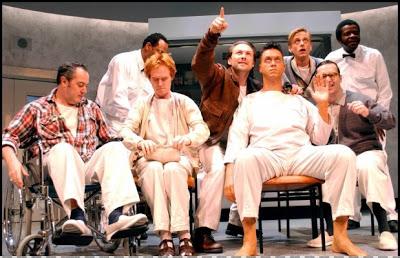 Slater (center) with the London cast of One Flew Over the Cuckoo's Nest.
Slater (center) with the London cast of One Flew Over the Cuckoo's Nest. So you got to assume the mantle of McMurphy, the role which most people would argue made Jack Nicholson, whom you were often compared to right after breaking out in Heathers. Was it tough to play a part that’s so heavily identified with one iconic actor’s interpretation of it?
It was tricky, and obviously I was scared of unconsciously imitating Nicholson’s performance. So I stayed away from the movie. I’d seen it of course, but not in years. I read the book, and that really provided me with my own source material for that character, and it’s a great character. Plus the book and the play are quite different from the movie, in terms of it being from the Chief’s point-of-view. I realized after doing it that Jack Nicholson has built a career out of doing that character. And why wouldn’t you? The guy’s heroic, he’s funny, he’s incredibly smart, just a great character.
What was your interpretation of him?
I didn’t play him as a lunatic, certainly. I played it more like it was all a big misunderstanding, and he was in this situation and trying to make the best of it, but he was in a totalitarian scenario, and his passion and ability to rally the troops and get the guys on his side was the thing I really identified with, and his ability to take on the system created a great sense of passion. The guy just wanted to have fun, and there was someone constantly standing in the way. He’s also a Christ-like figure who’s got his disciples and has to be sacrificed at the end in order to get these guys to rally.
It’s especially topical for the times we’re living in.
Oh yeah! It’s a universally identifiable story, and you can’t help but get caught up in it. We’d have nights where the audience would get so caught up in it that they’d be cheering for us to watch the World Series! One night people got into fights in the audience. Everyone really got into it. There was a sense of reality. Once the lights came up, I think they all felt like they’d been in the asylum with us.
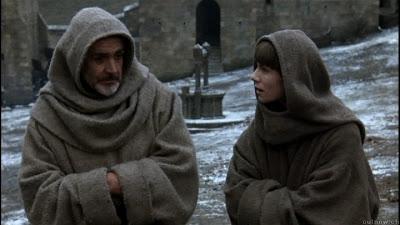 Slater and Sean Connery in The Name of the Rose.
Slater and Sean Connery in The Name of the Rose. The first film I saw you in was The Name of the Rose, where you got to play opposite the great Sean Connery. Heady stuff for a kid?
Sean Connery was great. I grew up watching the Bond movies, and working with him at 16 was like having a master class in acting, life, all sorts of things. He’s an incredible professional, a real gentleman, a man’s man. He also didn’t take any shit from anybody. He had earned his right to be who he was, and things moved along according to his plan. He was concerned about every element and how everything was treated on the set. He didn’t even want to see the horses mistreated. There was a horse wrangler on the set, and Sean didn’t like the way the guy had hit the horse with his riding crop. So he grabbed it from the guy and said (in Connery’s voice) “Don’t hit the fucking horses!” (laughs) I watched the film recently on cable, and really got emotional because it took me back to that time, and everything I was going through. It really is an absolutely astoundingly beautiful movie. The work that Jean-Jacques Annaud did…I don’t think I had a clue then what a special film it was. Every once in a while there’s a special project you get to be a part of, and that was one. I was always a sensitive kid, and I remember that wrapping that film was really hard for me. It was five months in Germany and Rome, and it was hard to say good-bye.
You got to work with Francis Coppola soon after on Tucker.
Another great experience. Francis was great, and Jeff Bridges, Joan Allen…God, those cars were amazing! I got to drive one of the Tuckers on this track where we were shooting. We were shooting on these stages at Paramount, and I walked around and saw some of the other things that were being filmed. I walked onto this one stage, and there was the Starship Enterprise! Only it was little. It was tiny. It was in a weird shape, and I was like “What the hell is this?” And it turned out they were building the ship for Star Trek: The Next Generation. Then they were filming the ending of Witches of Eastwick, and they had that animatronic Jack Nicholson there, which was really weird and scary to see, and just thinking “God, the movies are cool!” (laughs) I also remember working with Fred Forrest on Tucker. Fred’s got a real laid-back, kind of Nicholsonian drawl, and I remember being very aware of that, and really liking that. He was a big influence on me, Fred Forrest. Really interesting guy. The whole film was like a big family. Coppola sets that kind of mood. It was another instance of me looking around, age 18, thinking “Jesus, what the hell am I doing here?” (laughs) It still amazes me when I look at some of the films I’ve been a part of, and some of the people I’ve gotten to meet and work with. I also look back sometimes and realize that I was lucky to have lived through them and even to have survived them, at times. It’s certainly a testament to whatever I have in me that has that instinct.
I can imagine at that age, and through your early 20s, it was like sensory overload at times.
Yes, exactly. The overwhelm of being in these places, as exciting as they were, and dealing with different personalities, the intensity of this business, and the egos involved, dare I say it. It’s wild to be a kid and have those kinds of experiences.
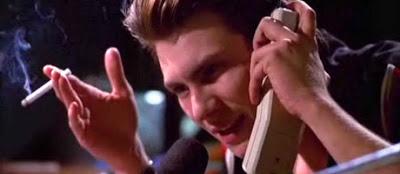 Slater as pirate DJ "Hard Harry" in Pump Up the Volume.
Slater as pirate DJ "Hard Harry" in Pump Up the Volume.But you also had two parents in the business who could help put it in perspective for you, certainly more so than if your dad had sold insurance and your mom was a schoolteacher.
Absolutely true. They certainly are passionate people, as well, and are colorful in their own ways, but they were always there to answer questions. As I said before, my dad was always the kind of guy who was willing to take me with him to work, and my mother being okay with that and with me being introduced to that life, it says a lot. My mother was casting Hair when I was about six, and I remember being downtown with that whole crew, and watching everybody rehearse, and just being involved in that world at that age was pretty rich. I remember that was the year of the big blackout, and we had to figure out how to get out of there in the dark…there were some really cool moments.
Heathers was the movie that changed everything for you. 20 years later you look at it, and you realize that nobody realized how fortuitous a film it was ten years before Columbine. It seemed so far out at the time, and now it plays much more disturbing than funny.
Yeah, yeah. Interesting. As time goes on, perceptions change. Everything’s changed, particularly after 9/11. It’s scarier and sadder, and not that I claim to know anything about politics, but certainly the last eight years have been difficult for everybody, and confusing and scarier than they were the previous eight years.
When we were growing up, there were certainly bad things that happened in the world, but nobody ever thinks they’ll look back on their childhood as being times of innocence, and now I feel like we really did come of age in a more innocent time.
It’s true. It was pretty simple. Reagan was this sort of father figure, and the ‘80s were a fun time, and now we’re in this warmongering period. I can only have hope for the future, that things are going to move in a more positive direction.
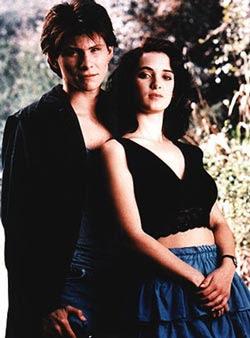 Slater with Winona Ryder in Heathers, his star-making turn.
Slater with Winona Ryder in Heathers, his star-making turn.Did you all feel at the time that Heathers was exploring uncharted territory for a “teen” film?
I think we all felt that it was pretty interesting and unique, yeah. I think everything works in retrospect. You don’t really know what you’re working on when you’re working on it. You have ideas what you’d like it to be, what it could be, but you never know until the end result. Nobody sets out to make a bad movie. (laughs) It was actually a really creative, fun shoot.
All the Nicholson comparisons started after that film. I’m sure it was flattering to an extent for you, but it must’ve gotten old eventually, especially considering I’m sure you were just being yourself.
Well look, if you’re going to be compared to someone…(laughs) Like I said, Fred Forrest has a lot of Nicholson qualities, as does my dad, so I’m sure a lot of that rubbed off on me. I’d seen Easy Rider and thought Nicholson was the coolest guy on the planet. When I saw Witches of Eastwick being shot, I just identified with Nicholson, and thought he was the greatest. When I read the script for Heathers, I guess I saw some qualities in the character of Jason Dean that I could identify with, and everything just kind of jelled into something that allowed people to make that kind of comparison. I was certainly playing a character. If they’d shot Jason Dean’s room in the movie, he probably would have had a poster of The Shining or Easy Rider because he was just that guy. So were there qualities in that character that were Nicholsonian? Absolutely!
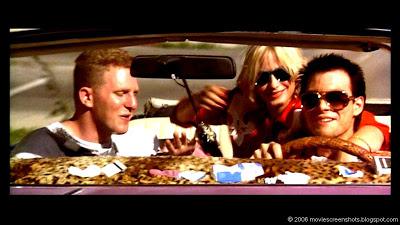 L to R: Michael Rapaport, Patricia Arquette and Slater in True Romance.
L to R: Michael Rapaport, Patricia Arquette and Slater in True Romance. Another groundbreaking movie we have to discuss is True Romance.
At the time I got the script, nobody had really heard of Quentin Tarantino. He’d made this little independent movie, Reservoir Dogs. I saw it with Patricia Arquette at the CAA screening room. It really affected me. I laughed, I was horrified, it was something new. I thought Quentin was great, and loved him and his passionate personality. The cast just kept getting bigger and bigger with more and more interesting people. The scene between Dennis Hopper and Chris Walken was one of the first scenes that was edited together, and Tony Scott showed it to us on the set, and we were all just blown away. So yeah, great experience, great script but again, you never know what a film is going to be until you see the final product. In this case, it was another one of those really special experiences that resulted in an equally amazing movie.
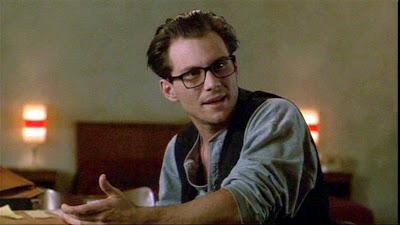 Slater in Interview With the Vampire, playing the role originally intended for the late River Phoenix. Slater donated his entire salary to charity.
Slater in Interview With the Vampire, playing the role originally intended for the late River Phoenix. Slater donated his entire salary to charity.In Interview With the Vampire, you took over the role that River Phoenix was originally cast. Did you know him at all?
Not really. We’d met before and I respected him, and his work tremendously. That was so tragic, and it was really awkward to be stepping into that kind of scenario. But I think I eased my own discomfort by not accepting money for it and donating my salary to his charities. It was great to work with Neil Jordan, and Brad Pitt was great, and that was the second time we’d worked together, of course, after True Romance.
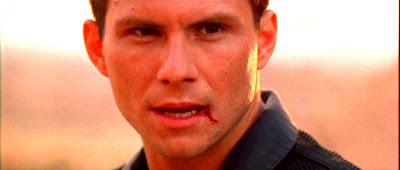 Slater in John Woo's Broken Arrow.
Slater in John Woo's Broken Arrow. You got to work with the great John Woo twice.
Amazing filmmaker. He’s a very cerebral man, very sweet, but very quiet, much in the same way Neil Jordan is. I don’t know where John’s English is today, but at that time, he didn’t speak English that well, so our communication was limited. Basically, he told me I was supposed to be playing Steve McQueen and I forget who he said John Travolta was supposed to be, but that was all the direction I really got. (laughs) But what a genius he is, a real master of the medium. Also, when I did Windtalkers, it was a real treat to work with Nic Cage. He’s one of our greatest actors. Everything he does, every choice he makes, it just blows my mind. I just watched Face/Off again the other night. What an unbelievable movie that is! And Nic and Travolta are amazing in it. I could watch that movie all day.
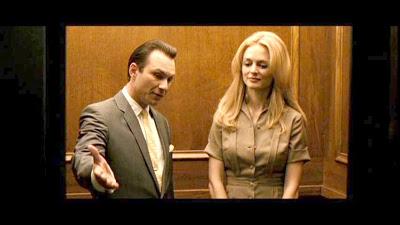 Slater and Heather Graham in Emilio Estevez's Bobby.
Slater and Heather Graham in Emilio Estevez's Bobby.Recently you were in Emilio Estevez’s Bobby, which I thought did a beautiful job of capturing a time and place in history.
Yeah, it really did. Emilio did a phenomenal job and to be a part of that incredible group that he assembled…I mean Anthony Hopkins, William H. Macy, Sharon Stone, Martin Sheen, Harry Belafonte. It was like a who’s-who of talent. Everybody showed up on that giving 150%, we were all so proud of Emilio who, in my opinion, knocked it out of the park. The audience reaction was amazing in Venice, where it premiered. There was a ten minute standing ovation. What’s even more amazing, is that the film wasn’t even produced by Americans, but by Russians! In terms of acting, it was fun to sort of immerse myself in that character, who was so part of another time, and another mindset. Being on the set of the film was like going back in time. It was really powerful, very realistic, especially recreating those last moments. It’s funny, we shot at the Ambassador Hotel, where it all happened, right before they tore it down, and I’ve shot a couple other things there, including True Romance, and it was a really creepy place. But I’m very happy we got to shoot the film there while it was still standing.
You mentioned River Phoenix earlier. In the past year, we’ve lost a couple talented young actors tragically. You’ve been through a lot professionally and personally in this business, and you’ve survived. Is there an outlook one has to adopt to be a survivor or is it just something you choose?
What can I say? It’s a wild world. It takes a certain amount of denial sometimes just to wake up and get through the day. (laughs) But we try to show up, do our best, do our job, and try not to be an asshole in the process. If you can do that, then you’re ahead of the game.
That’s the magic word, isn’t it?
Amen, brother.
